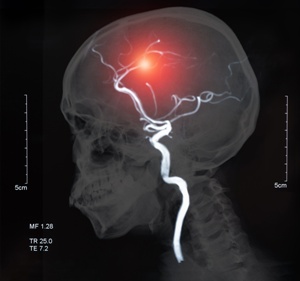 You may not have known you had a brain aneurysm. Most people with brain aneurysms are unaware of their conditions until a doctor finds it while diagnosing another condition. However, when a brain aneurysm ruptures, a prompt diagnosis and treatment plan are necessary to save your life.
You may not have known you had a brain aneurysm. Most people with brain aneurysms are unaware of their conditions until a doctor finds it while diagnosing another condition. However, when a brain aneurysm ruptures, a prompt diagnosis and treatment plan are necessary to save your life.
ER Brain Aneurysm Diagnosis
When symptoms of a ruptured brain aneurysm started, you likely knew that you had a medical emergency, even if you didn’t know exactly what was happening. Symptoms of a ruptured brain aneurysm often include:
- A severe headache that comes on suddenly
- Stiff neck
- Nausea and vomiting
- Vision problems
- Seizures
- Confusion
- Loss of consciousness
These symptoms occur because the weakened blood vessel in the brain has ruptured, causing bleeding in the brain.
Brain Aneurysm Treatment
If you have symptoms of a ruptured brain aneurysm, emergency room staff should act quickly to diagnose your condition. Typically, a CT scan is used to see if there has been any bleeding in the brain. If you present with symptoms of a ruptured brain aneurysm and a CT scan does not detect any bleeding, then other tests such as a cerebrospinal fluid test, an MRI, or a cerebral angiogram may be used.
After your condition is diagnosed, the emergency room doctor should review your treatment options with you. Treatment options may include:
- Surgical clipping. A neurosurgeon will remove part of your skull to examine your brain and to insert a metal clip to stop blood flow to the aneurysm.
- Endovascular coiling. This type of procedure does not involve going directly through your skull. Instead, the surgeon will insert a tube into an artery and then to the aneurysm where a wire will coil up and seal off the aneurysm.
- Flow diverters. In this kind of procedure, a stent-like implant will divert blood flow from the aneurysm.
The right treatment for you depends on many factors that should be reviewed with your doctor.
Dangers of Delayed Brain Aneurysm Treatment
Since a ruptured brain aneurysm is a potentially fatal condition, and prompt treatment can prevent death in some cases, you require immediate medical treatment. How quickly you are triaged, diagnosed, and treated depends on many different factors, including how many people are working in the emergency room, how many other patients are in the emergency room and the nature of their conditions, and whether staff members followed emergency room procedures.
If your diagnosis or treatment is delayed, the blood from the rupture or the pressure inside your skull could cause irreversible damage or death. Specifically, you could suffer from:
- Additional bleeding. Without treatment, the brain aneurysm could rupture again, causing further brain damage.
- Vasospasms. The blood vessels in your brain could narrow and limit blood flow. A stroke could result.
- Hydrocephalus. The blood from the ruptured aneurysm can block the circulation of the fluid around the brain, which can increase pressure on the brain and damage brain tissue.
Protect Your Rights After a Delayed Diagnosis Injury
Ruptured brain aneurysms are medical emergencies. Even with prompt diagnosis and treatment, irreversible injuries or death may result. However, a delay in diagnosis or treatment may make significant injuries and fatalities even more likely. To recover damages for your injuries or your loved one’s death, you will need to prove that the injury or fatality occurred because of the delay in treatment and not just because of the ruptured brain aneurysm.
Our staff nurse and experienced lawyers will thoroughly investigate your claim, advise you of your legal rights, and fight for your fair compensation for all of your injuries, including past and future:
- Healthcare costs
- Lost income
- Out-of-pocket expenses
- Physical pain
- Emotional suffering
Contact our experienced medical malpractice law firm today. Our attorneys and staff nurse will help you get the answers you need so that you can make informed decisions about what to do next. Call us or start a live chat any time—24/7/365—to set up your free initial consultation.
Related Links: